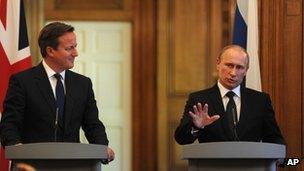Syria - No deal in sight after Downing Street talks
- Published

David Cameron said it was "no secret" he and Vladimir Putin had disagreements over Syria
What we used to call the West finds itself in a pretty strange place when it comes to Syria and Vladimir Putin knows it.
Speaking at Downing Street the Russian president was completely unapologetic for arming the Syrian government - it was quite legal he said - and looked unimpressed when his host, the prime minister, called President Assad a "murderous dictator".
The renewed talk of arming the rebels was meant to put pressure on Putin so that he would, in turn, pressurise the Syrian regime to agree to peace talks. Here's why that strategy may not work.
The US president talks of supplying the rebels with arms but shows little sign of wanting to do so whilst the British prime minister sounds positively enthusiastic about sending weapons but cannot persuade his own government, let alone parliament, to do so.
'Stark contrast'
There is a stark contrast in the way the US and the UK have talked about this issue. Last week it fell to a relatively lowly US figure to announce America's change of policy.
He did it in words so vague and ambiguous that some in the US administration briefed that it might mean a no fly zone and the supply of anti-aircraft and anti-tank missiles whilst others suggested it meant only small arms and ammunition. We still don't know the answer. We still haven't heard from the president himself.
Compare that with the words of David Cameron almost two weeks ago. Speaking to the House of Commons on 3rd June the prime minister condemned "those who argue against ... doing more to support the opposition" as "making some of the same arguments used in the Bosnian conflict 20 years ago."
He went on "we were told then, as we are now, that taking action would have bad consequences, but not taking action is a decision too, and in Bosnia it led to the slaughter of up to 200,000 people and did not stop the growth of extremism and radicalisation, but increased it. We should be clear, however, about the nature of what is happening in Syria today. It is not just a tragedy for Syria; it could end up being a tragedy for us, too, if we do not handle it properly."
For months Cameron has been trying to do to Obama what Tony Blair did to Bill Clinton over Bosnia in the late 90s - to persuade America that it must intervene and that there can be no hope for peace talks if it doesn't.
The prime minister sees Bashar Assad as a modern day equivalent of Slobodan Milosovic - in other words a dictator who must be shown that "he cannot fight his way to victory or use the talks to buy more time to slaughter (people) in their own homes and on their streets."
The irony is that Cameron, unlike Blair, cannot deliver military support himself. That's why the prime minister found himself having to strike a very different tone when he told SKY News: "I think where we can actually give the greatest assistance to the official proper Syrian opposition, is advice, is training and is technical support" - and not weapons.
His deputy Nick Clegg made the coalition's position plain when he told the BBC that "we don't believe it (arming the rebels) is the right thing to do at the moment."
No wonder the Russian president is not budging. He faces a British prime minister who cannot do what he believes in and an American president who doesn't show much sign of believing in what he's apparently committed to doing.
PS. The prime minister has told John Pienaar that President Putin "does not have a veto" on arming the rebels in Syria.
His interview will be on Radio 5 Live at 7pm.